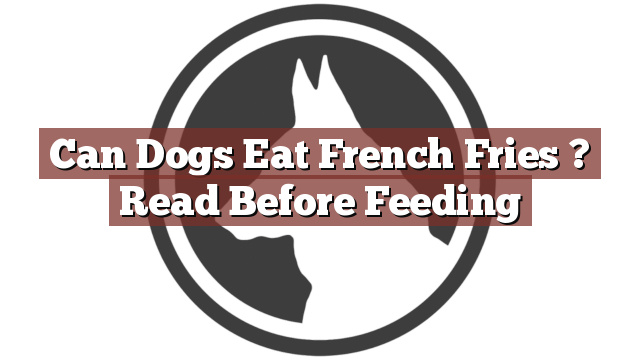Understanding Your Dog’s Dietary Needs
As a responsible pet owner, it is crucial to understand the dietary needs of your beloved furry friend. Dogs have specific nutritional requirements that differ from humans, and it is essential to provide them with a well-balanced diet to maintain their overall health and well-being. While dogs primarily thrive on a diet consisting of high-quality dog food, many pet owners often wonder if they can incorporate human food into their dog’s diet. One common question that arises is, "Can dogs eat French fries?"
Can Dogs Eat French Fries? Read Before Feeding
Can dogs eat French fries? The simple answer is no. While it may be tempting to share your plate of French fries with your canine companion, it is important to resist the urge. French fries are not suitable for dogs and can pose potential risks to their health.
French fries are typically deep-fried in oil, which makes them high in fat and salt content. Excessive consumption of fatty foods can lead to weight gain, obesity, and even pancreatitis in dogs. Additionally, the high sodium content in French fries can cause dehydration and electrolyte imbalances in dogs. Moreover, the seasonings or flavorings on French fries, such as garlic or onion powder, can be toxic to dogs.
Pros and Cons of Feeding French Fries to Dogs
Let’s discuss the pros and cons of feeding French fries to dogs to better understand why it should be avoided. The main disadvantage of feeding French fries to dogs is the high fat and salt content. Dogs have specific dietary requirements, and their bodies are not designed to process excessive amounts of fat and sodium. These can potentially lead to various health issues, including digestive problems, obesity, and cardiovascular diseases.
On the other hand, there are no significant benefits to feeding French fries to dogs. They do not provide any essential nutrients or contribute to a balanced diet. Instead, they can overshadow the nutritional value of the dog’s regular meals, leading to deficiencies in vital nutrients.
Conclusion: Consider Alternatives for a Healthier Dog Diet
In conclusion, it is best to avoid feeding French fries to dogs. While they may enjoy the taste, the potential risks and lack of nutritional value outweigh any temporary satisfaction. Instead, focus on providing your dog with a well-balanced diet that consists of high-quality dog food specifically formulated to meet their nutritional needs. If you want to treat your furry friend occasionally, there are healthier alternatives available, such as small pieces of cooked chicken or carrots. Always consult with your veterinarian regarding your dog’s dietary needs and any concerns you may have to ensure their health and happiness for years to come.
Thank you for taking the time to read through our exploration of [page_title]. As every dog lover knows, our furry friends have unique dietary needs and responses, often varying from one canine to another. This is why it's paramount to approach any changes in their diet with caution and knowledge.
Before introducing any new treats or making alterations to your dog's diet based on our insights, it's crucial to consult with a veterinarian about [page_title]. Their expertise ensures that the choices you make are well-suited to your particular pet's health and well-being.
Even seemingly harmless foods can sometimes lead to allergic reactions or digestive issues, which is why monitoring your dog after introducing any new food item is essential.
The content provided here on [page_title] is crafted with care, thorough research, and a genuine love for dogs. Nevertheless, it serves as a general guideline and should not be considered a substitute for professional veterinary advice.
Always prioritize the expert insights of your veterinarian, and remember that the health and happiness of your furry companion come first.
May your journey with your pet continue to be filled with joy, love, and safe culinary adventures. Happy reading, and even happier snacking for your canine friend!

